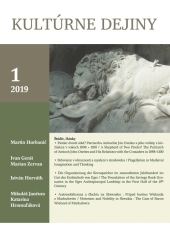Pastier dvoch stád? Patriarcha Antiochie Ján Oxeites a jeho vzťahy s križiakmi v rokoch 1098 – 1100
A Shepherd of Two Flocks? The Patriarch of Antioch John Oxeites and His Relations with the Crusaders in 1098–1100
Author(s): Martin HurbaničSubject(s): Christian Theology and Religion, Theology and Religion, History of Religion
Published by: VERBUM - vydavateľstvo Katolíckej univerzity v Ružomberku
Keywords: The First Crusade; patriarch John Oxeites; Bohemond of Antioch; The Latin-Greek religious polemic; Schism of 1054; the azyme controversy;
Summary/Abstract: After the occupation of the Syrian Antioch by the army of the First Crusade in 1098, the Greek Orthodox patriarch John V Oxeites (1091–1110) became the spiritual representative of the local Greek Orthodox population as well as of the Latin Christians. This consensus was probably based on the instructions of Pope Urban II, who pursued a policy of liberation of the Eastern Churches while preserving the existing arrangement of their patriarchates headed by the Orthodox Greek hierarchs. The present study evaluates the activity of John Oxeites on the patriarchal throne of Antioch after its occupation by the Crusaders with respect to the limits of the mutual coexistence and cooperation. The relations between the South Italian Norman Crusaders and the Greek patriarch were problematic for several reasons. The first one concerns his loyalty towards the new rulers. Due to his appointment in Constantinople, the Normans could still consider Oxeites as the representative of the Byzantine Emperor Alexios Komnenos and his interests in Antioch. Such a suspicion was certainly not unjustified, because there is a sign of evidence that Oxeites himself did not consider the new Latin rule as legitimate. Beside of that, the day-by-day communication was also hampered by the existing language barrier, but above all by the different liturgical practices between the Latin and Greek Church. Based on his own statements, Oxeites, like the majority of the Byzantine clergy, considered the Roman Catholic mass with unleavened bread as a fundamental theological problem and the main obstacle to the eventual unification of both churches.
Journal: Kultúrne dejiny
- Issue Year: 10/2019
- Issue No: 1
- Page Range: 6-24
- Page Count: 19
- Language: Slovak

